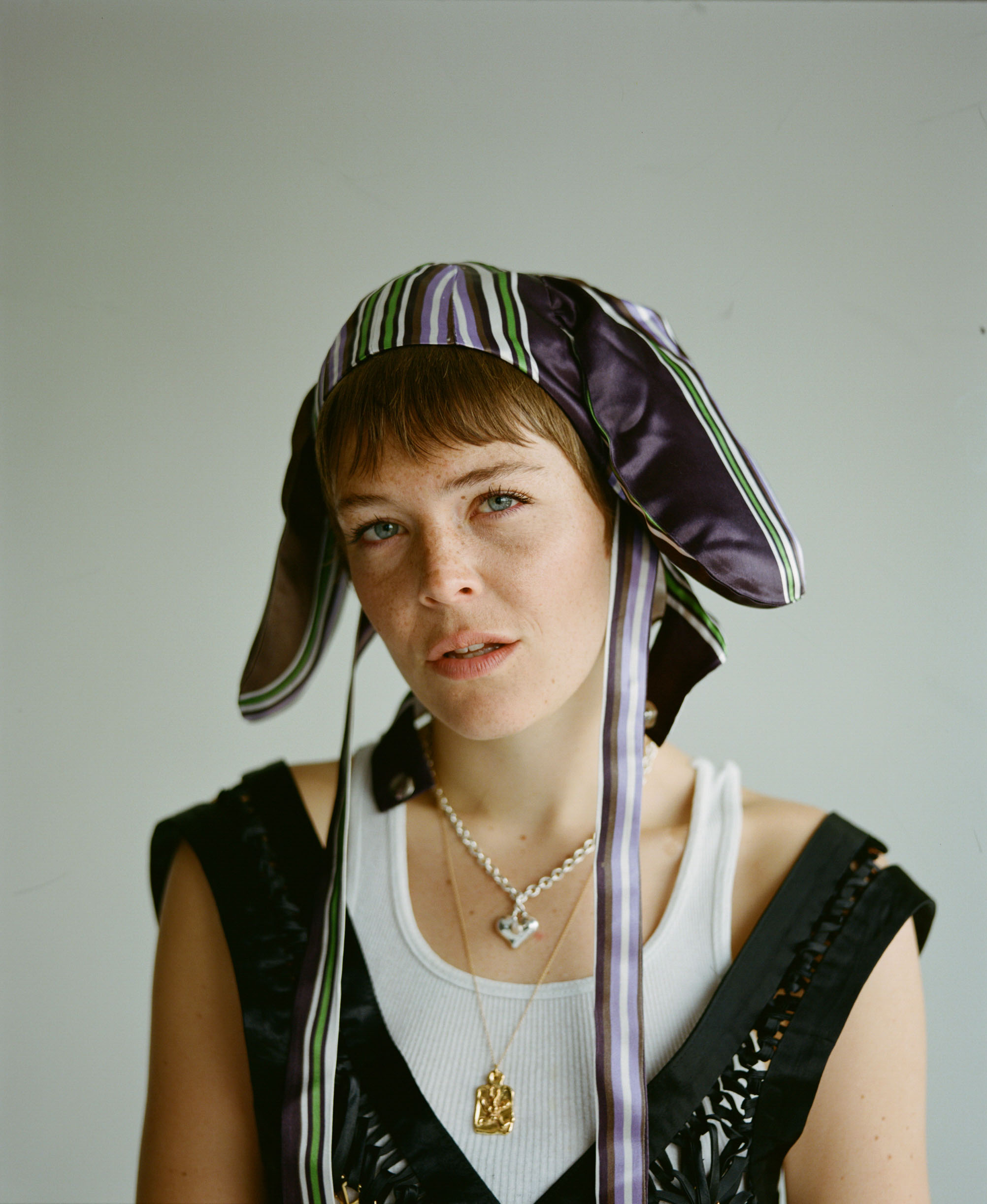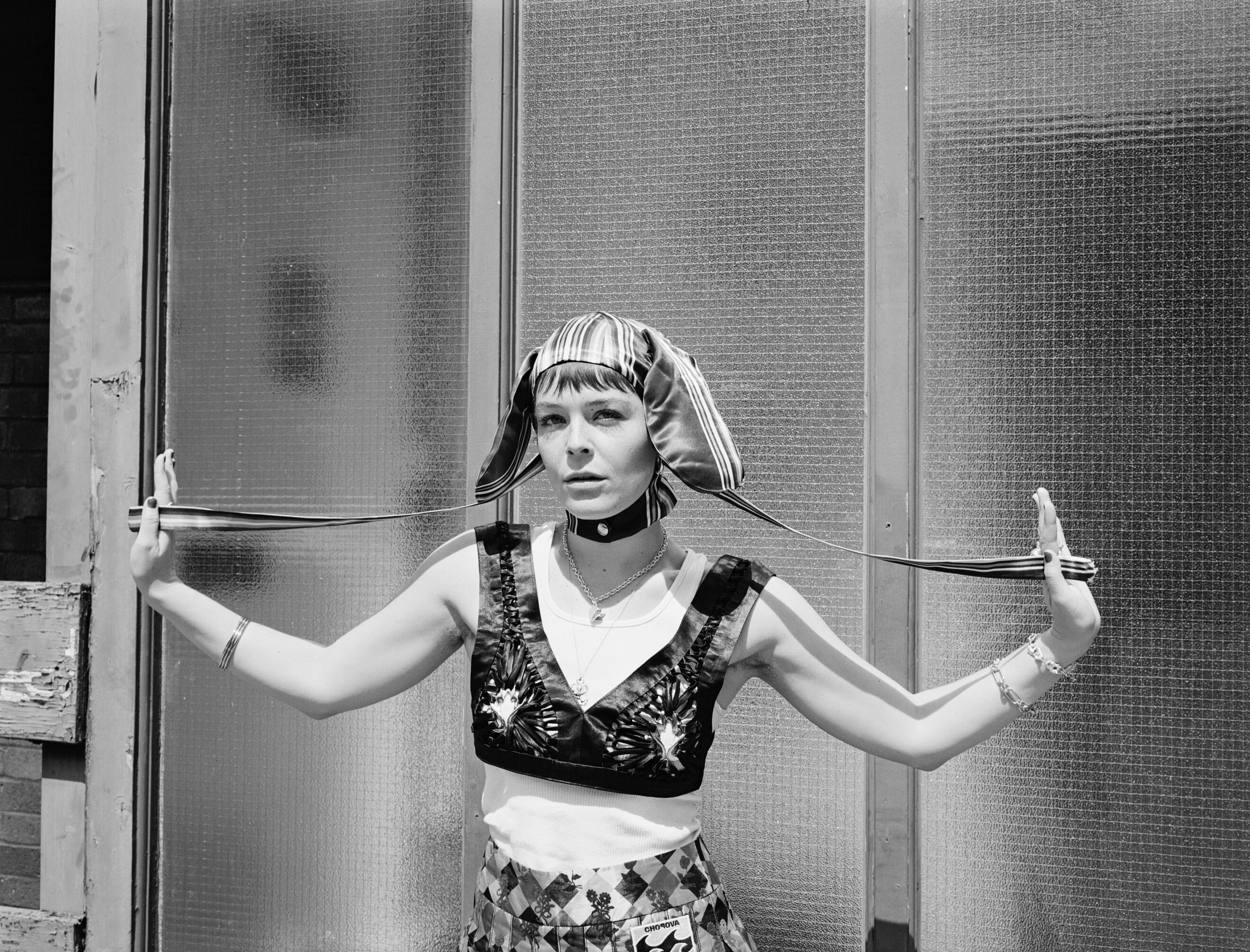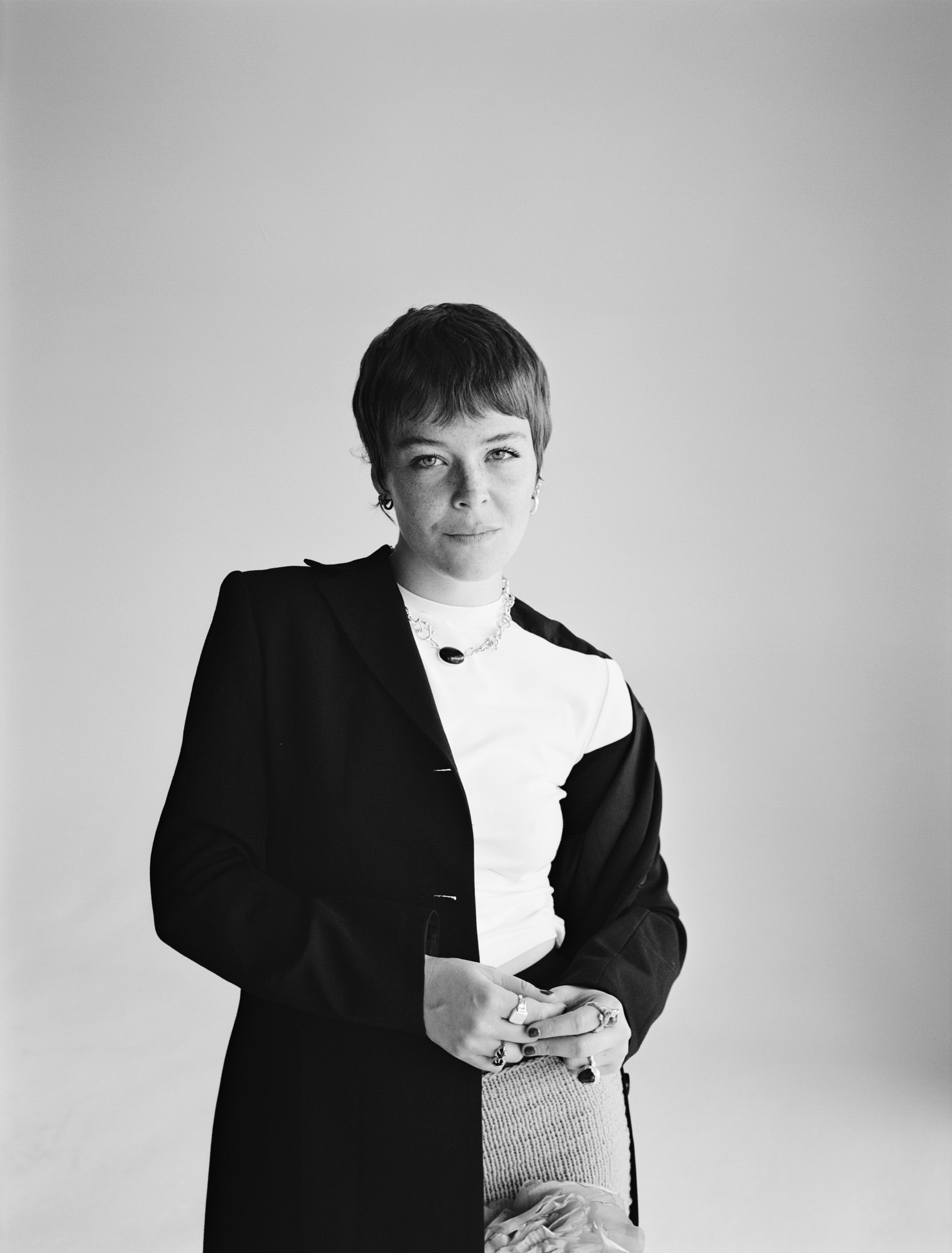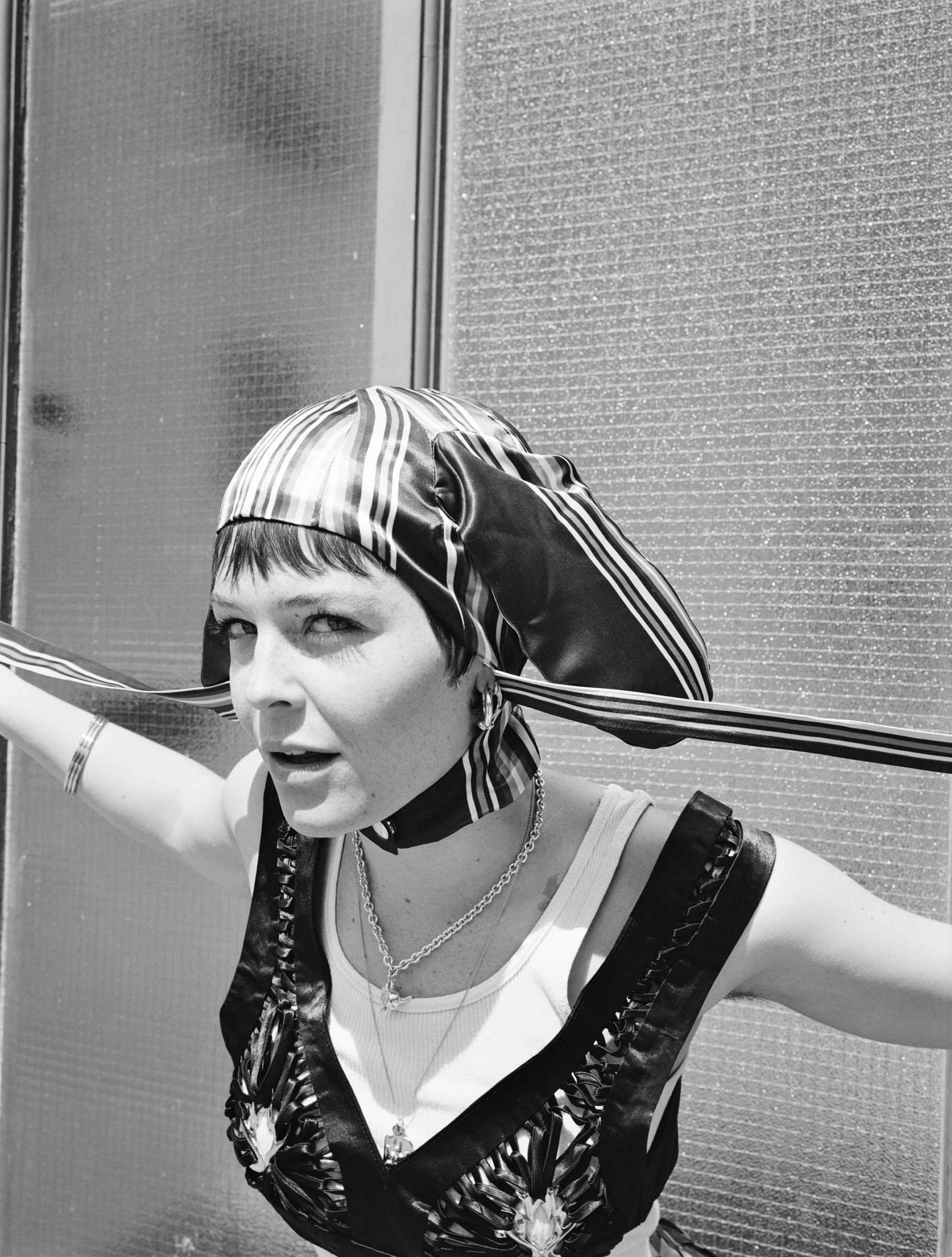Maggie Rogers thinks you should put pleasure first
Written by ABR on 27/07/2022
It’s almost here. Maggie Rogers’ new album Surrender — her second major label release, the one she said she’d “tour for a lifetime” — drops in just a few days. “I don’t think you should put music out if you don’t love it,” the 28-year-old singer, songwriter and producer says over Zoom, calling from a wood-filled Berlin apartment. “It sort of feels like the whole fucking point.”
Recent years allowed the artist ample time to make careful, deliberate choices with her new work; leaving every element of Surrender — a rousing, diaristic pop masterpiece — full of multiple, shifting meanings. Take, for instance, the album’s Kelly Jeffrey-shot cover art: a black-and-white close-up of the artist’s face that captures the wispy ends of her pixie bangs and cuts off just above the mouth. The proximity is “because this record is so intimate,” she says. “There’s so much intensity in the eyes, and vulnerability. I sort of just loved the idea of my eyes haunting and watching over everyone.”
Most of Surrender — mixing, mastering and all — was finished before Maggie began her master’s degree at Harvard Divinity School in September last year. She enrolled to study spirituality in the context of public gatherings, as well as ethics and power in pop culture (“A lot of what I studied in grad school was the relationships between artists and audiences, and the way music can be an agent for peace in the world,” she says), but also to inject some much-needed normality into her life, which had been hijacked by fame in 2016 thanks to a viral endorsement from Pharrell Williams.

For Maggie — Margaret Debay Rogers — a banjo-focused NYU student from rural Maryland, it was a dream come true, to an extent. Behind the scenes of the sold-out shows, festival appearances and major award nominations, she suffered panic attacks and became subject to creepy fan behaviour; burnt out from touring Heard It in a Past Life, her 2019 major-label debut, she hunkered down in coastal Maine when coronavirus hit, settling at her parents’ house just outside of Portland. Soon, she found herself pining for the electricity of a good stage show. “I thought so much about live music, man,” she says. “It was what I missed more than anything. I was really just hoping for a world where live music would come back.”
And come back it did. Maggie’s plans for the Surrender cycle include a month travelling across Europe for the aptly-named Feral Joy tour. “Especially during the pandemic, I just felt so numb all the time. And then I’d have these massive waves of feeling,” she says. “It’s so scary to give over to that, but I found a lot of joy and a lot of freedom in that feeling too.” It’s a feeling that straightforwardly fuels the propulsive, dance-inspired heart of Surrender: “It’s about a time in my life where I was being asked to let go and just be open to the experience of feeling. I was really looking for a sense of physicality: big drums, distorted guitars, things that reminded me of what it’s like to communally experience music.”

Like with Surrender’s predecessor, Heard It in a Past Life, Maggie had the record’s title before anything else. Of course, ‘surrender’ is “a pretty loaded, complicated word.” She continues: “I think that it can have a lot of negative connotations, but for me it’s so deeply and overwhelmingly positive. It’s about getting into feeling everything there is to feel.” Accordingly, each of the album’s 12 songs reads like a prose poem. On “Begging For Rain” she evokes images of “flames higher than rockets”, “cherry stems and black barbed wire”; through steady synths and soaring vocals, “Be Cool” sees Maggie “sick of the sound of self-importance” and yearning for a lazy summer, “just to be a teenager drunk on the month of June”.
Her romance with British rock comes through most clearly on the album’s shimmering guitar chords: “I fell in love with Oasis and New Order,” she says, also citing U2, Massive Attack and The Cardigans — “specifically that record Gran Turismo” — as enduring influences. The idea of pleasure as “a form of rebellion” and “act of joy” is also a central theme in Surrender. “I think society is not always going to understand or accept your means of pleasure, but I think it’s all we can do to try and live a full and whole existence.”
But the record’s real star is New York City, where Maggie first moved when she was 18. “I lived there for six years, and then I went on tour. So it’s sort of the last place I had a normal existence,” she says. “I had to move out of my grad school apartment two weeks ago, so I’m not totally sure where I live right now. But I will figure that out on the other side of this record.” Her possessions reside in a Los Angeles flat for now, but “I could 100% see myself back in New York City. It’s where my heart lives. It was where I learned what it meant to be an artist, where I was in bands for the first time. So much about this album is coming back to a sense of making music just for fun. What it felt like at the beginning.”

What making music in New York felt like at the beginning (of the 00s, specifically) was extensively chronicled in 2017’s Meet Me in the Bathroom, an oral history following the rise of alt rock bands like The Strokes and Yeah Yeah Yeahs. In the brief period she entertained the idea of a media career, Maggie helped music journalist Lizzy Goodman transcribe and edit the more than 200 original interviews for the book.
“I think a lot of the work I did for Meet Me in the Bathroom did sort of seep into this record, because New York is such a powerful character in it,” she says. “I thought a lot about the artists at that time and that unbridled, raw energy. It felt like there was some mystery, and everything felt quite physical.” The sweaty, vibrant visuals for “Want Want” — a blistering ode to sex and longing — were filmed in a Koreatown karaoke bar, but the city makes a grander cameo in the playful, stylish video for Surrender’s lead single “That’s Where I Am”, which includes cameos from Quil Lemons, Hamilton Leithauser and the legendary David Byrne.
“I got [David’s] email from a friend and cold-emailed him and said, ‘Hey, I love your music. You’re one of my heroes. I’m making this music video. Here’s the song. We’ll be downtown filming at this time tomorrow. I don’t know if there’s any way you could make it?’” she explains. “And he was like, ‘Oh, I’m getting a haircut downtown right around that time. I’ll be there at 2:30.’”
Longing for an old school New York, for the physical in a digital era, “makes a lot of sense” to Maggie. “I think it’s been such a tricky couple of years with the way that the music industry has become so digital — I can’t imagine what it would be like to be a new artist right now, because so much of the music industry doesn’t feel like it’s even about music at all,” she says.

In recent months, a spate of popstars including Halsey, Florence Welch and FKA Twigs have spoken out their experiences being pressured by their labels into promoting themselves on TikTok. But the bidding war over her first record contract, and her ultimate decision to licence her music to Capitol Records through her own Debay Sounds imprint, afforded Maggie more agency than most.
Posting front-facing videos to TikTok on an almost daily basis, she looks pretty comfortable on social media. Is she? “First of all, what you see is not the reality! I think people should flag that across all social media platforms,” she says, laughing. “Ultimately, I think that these things are storytelling devices. I just find ways to interact with it that feel authentic to me. I really look to Patti Smith in that sense, her Instagram feels like such a great way to use social media as an artistic tool.” Has it helped her better come to terms with existing in the public eye in such a major way? “I don’t know that it’s something anybody ever learns to do, or gets comfortable with. I certainly have a better sense of boundaries, but I wonder if part of that is also just growing up. Like, I’m 28. That feels on par.”
These days, online drama seems pretty laughable to her. A recent example: when Beyoncé announced that her new album Renaissance would be arriving on the 29th of July, the same Friday as Surrender, warring stan Twitter factions invented a rivalry between the records. “I was just like, ‘Joke’s on you, I’m just as excited as everybody else!’” Maggie says, chuckling. “A new Beyoncé record is just good for everyone, and the idea that someone thought that I might be an inch upset about it?” she trails off. “Also, the idea that anybody thinks that me and Beyoncé are somehow in competition with each other is hilarious.”
It seems there’s not much that can detract from the sheer bliss of releasing Surrender. “I know the ins and outs of every second of every piece of audio on this record,” she says. “It just feels like a celebration. I was so overwhelmed at the beginning of my career. It was pre-#MeToo; I was really scared of what it meant to be a woman in the industry. But after the pandemic, I’m like, ‘Look, this isn’t so serious. It’s meant to be fun!’” she adds. “Now I’m really just trying to focus on enjoying it.”
Surrender arrives on July 29. Buy it here.

Credits
Photography Sophie Davidson
Styling Maggie Rogers



 ABR Group
ABR Group